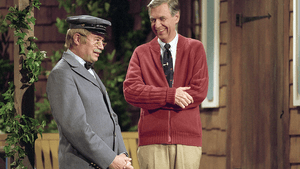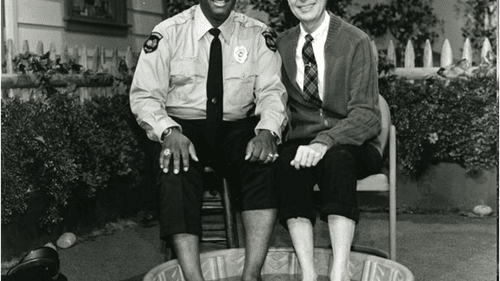Stay in the Loop
BSR publishes on a weekly schedule, with an email newsletter every Wednesday and Thursday morning. There’s no paywall, and subscribing is always free.
Mr. Rogers returns (and not a moment too soon)
Morgan Neville's 'Won't You Be My Neighbor?'

There are two situations in which I have sat quietly with a room full of openly weeping adults: funerals, and a Saturday matinee of Won’t You Be My Neighbor? at the Ritz East. The trumpeting of noses into Kleenex was so regular, we were like a herd of beleaguered elephants.
Director Morgan Neville’s documentary about the career of Pennsylvania’s own Fred Rogers is a deft, understated portrait of a guy whose unhurried, pellucid bonhomie already seems like the stuff of fairytales. And this just 15 years after his death.
The immortal cardigans
I didn’t watch a lot of TV as a child in the 1980s and early ‘90s (my mom had a long list of shows that were “crass”). But I remember how Mr. Rogers came in the door, swapped his blazer for a colorful cardigan hanging neatly in his closet, and changed out of his loafers and into a pair of comfy rubber-and-canvas sneakers. The small red trolley in his house trundled into another world, with a lacquer-faced yet expressive king and fanciful, chatty little animals.
I guess finding the right words is my adult job description, but it’s hard to express the steady, affirming satisfaction I felt when Mr. Rogers donned his sweater.
The real deal
This superb documentary underscores the testimony of its commentators on the genuine quality of Rogers’s onscreen persona by offering relatively few details of his personal life. We hear briefly that he suffered many childhood illnesses and was quarantined in bed. We see pensive footage of him on the beach, but this is a matter of theme and mood, not biographical detail: the commentators don’t identify his longtime summer home in Nantucket.
We learn that near the end of his life, he suffered stomach pain, but the film doesn’t dwell on his death from cancer. It’s all as if to say that if you watched the man on TV and take his onscreen mission seriously, you know him already.

While a friend and I debated seeing the documentary, she said she wasn’t sure what to believe about it, because of the rumors that Mr. Rogers’s sweaters covered his tattoos or that he was a killer with the Navy Seals. Commentators like François Clemmons (of Officer Clemmons fame), Nick Tallo (floor manager for 570 episodes of Mr. Rogers’ Neighborhood), and Rogers’s wife Joanne handily dispel these weirdly persistent legends.
Hello, Officer Clemmons
The film also gently handles Rogers’s relationship with Clemmons, who says Rogers personally insisted Clemmons could never publicly come out as gay and risk the show’s sponsorships, despite Rogers’s personal bond with his costar. Rogers himself sometimes faced questions about his own sexuality, and his loved ones weigh in.
The film touches on many significant moments in the TV show, like when it put horrific world events into a manageable context for youngsters. Try not to mist up at the footage of Rogers inviting Clemmons to dip his feet into a plastic pool with him, alongside wrenching 1964 footage of a Florida hotel manager dumping acid into a pool full of African-American swimmers.
The space of a minute
The film dabbles in some innocent and unalloyed hilarity when it contrasts the pie-splatting clowns, burgeoning mass-market consumerism, and gaudy, flashing cartoons of the day with Mr. Rogers watching a turtle, or setting a timer and sitting silently on camera so kids could learn how long a minute was.
Some surprisingly subversive on-set hijinks also bring guffaws. Colleagues note Rogers had a knack for well-placed silences, which drew people of all ages into a reflective state of openness and safety — or turned the tables on prankers.

A Christian Republican
Rogers was a Presbyterian minister, and the film respects his personal faith while focusing on his role as a late-20th-century televangelist for simple humanity. He was a lifelong Republican, but not one most Republicans today would sup with. As a public-media champion and an antiracist with a calm, sincere dedication to sharing facts, he couldn’t be less like many Republicans today.
With adroit subtlety, the film highlights conservative backlash to Rogers’s signature mantra, “I like you just the way you are.” To his foes, it marked the spawning of an insufferably entitled generation: people trampling a righteous meritocracy where respect is earned, not given to you simply because you’re alive.
But when Rogers said this into a television camera, he said it to everyone — if you are innately worthy of love, so are your neighbors. This is no toxic, individualistic pander. It’s a starter manual for the very fabric of a functional society whose members, one might even say, are endowed with certain inalienable rights.
Who would you thank?
True to the way Mr. Rogers encouraged us in life (as at the 1997 Daytime Emmys) to think about those who love us and made us who we are, the film’s commentators close on the same appropriately silent reflections, tacitly inviting us to join them. Tears fell on camera, I pressed the sleeves of my sweater to my eyes, and the credits rolled amid a chorus of sniffling.
The Avengers it ain’t. Won’t You Be My Neighbor? offers no tantalizing epilogue to audience members who wait out the credits. But everyone in that theater did, enveloped by Rogers’s piano.
Maybe we were embarrassed to go into the lobby crying. Or maybe we wanted to inhabit that space together in safe and happy silence for just a little longer.
What, When, Where
Won’t You Be My Neighbor? Directed by Morgan Neville. Philadelphia-area showtimes.
Sign up for our newsletter
All of the week's new articles, all in one place. Sign up for the free weekly BSR newsletters, and don't miss a conversation.

 Alaina Johns
Alaina Johns